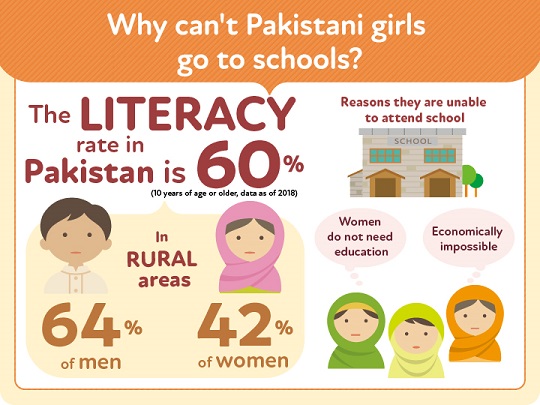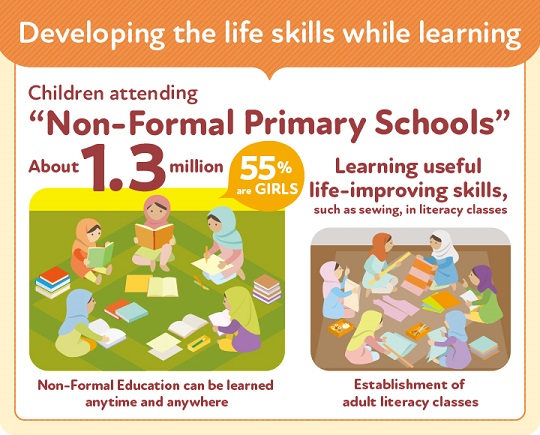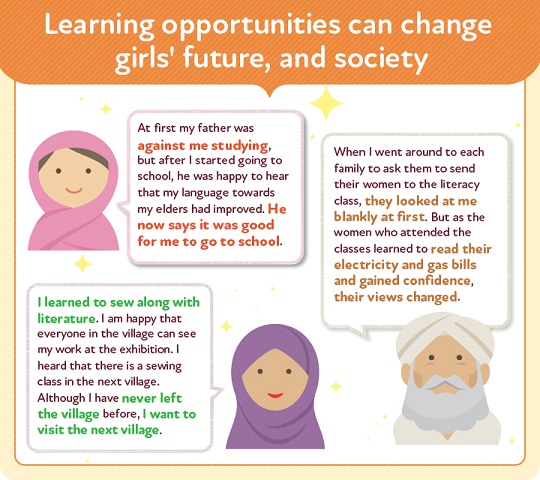Oct. 11 International Day of the Girl Child: Making the world a place where girls can fulfill their dreams
2020.10.08
The reality still exists that girls are deprived of the opportunity to learn simply because they are girls. This is due to a variety of reasons, including the value system that women do not need education and the physical constraints of not having schools accessible to them.
Oct. 11 is the International Day of the Girl Child, established by the United Nations. It was enacted in 2012 to empower girls around the world who are more likely to be out-of-school children compared to boys, more vulnerable due to forced marriage at a young age, and poverty.
JICA is promoting various initiatives to realize a society where girls can equally fulfill their dreams for the future and where everyone can learn equally in developing countries.
One of the initiatives is to create venues for girls in Pakistan to learn anytime and anywhere, even if they cannot receive formal schoolings, and to provide the entire community, including boys and adult women, with the opportunity to learn to read, write, and do arithmetic, which is essential for human life. When girls learn to combine literacy with vocational and practical knowledge, it improves their livelihoods and opens up employment opportunities, and prepares them to carve out their own lives. This enabled girls and women learn more easily.

Source: Pakistan Academy of Education Planning and Management
The reason why girls are not able to go to schools in Pakistan is not because there are a few local schools geographically. Even if there are nearby schools, there are other reasons such as schools having no girls' toilets. It is also because there is a lack of understanding. Many people believe that girls do not need education due to the traditional notions that girls will get married and leave home one day, and will not be family breadwinners.
Furthermore, in rural areas, where parents are often illiterate, children have few opportunities to become familiar with letters and numbers at early ages (without books, magazines, or calendars in the house). Besides the lack of learning opportunities at home, the lack of access to schooling, such as reading, writing, and arithmetic, also hinders their ability to make correct decisions about information and career options when they grow up in the future.
In response to this, JICA and the Government of Pakistan worked together to create a system of “Non-Formal Education” that enables anyone to learn at any age, any time, and any place.”

Source: Pakistan Academy of Education Planning and Management
Since 2004, JICA has been promoting the development of non-formal schools for children in Pakistan who have difficulty in attending formal schools. Currently, about 1.3 million children (55% girls) are attending non-formal schools.
The non-formal schools are set up within a geographical community and are accessible from the children’s home. There has been a cultural taboo for girls to go to school alone, but with the non-formal schools located nearby, they can feel at ease attending. The textbooks used are easy to understand for girls with illustrations of stories of women who play leadership roles, episodes of gender equality, and participation in society. What would take five years to learn in a traditional school can be learned in three and a half years, and if the students pass the examinations, they can earn a primary school diploma and move on to a public secondary school.
At the same time, adult literacy classes are also being instituted to teach literacy and life skills. In Pakistan, it is common practice for women to be kept in their villages (and not allowed to leave), and these adult literacy classes have become one of the few places for women to exchange information, not only on literacy, but also on health, hygiene, and life skills. They also learn how to sew and produce products such as jam from nearby mangoes, which helps to improve their income.

The expansion of learning opportunities for girls in Pakistan is not only due to the physical backdrop of the establishment of non-formal schools, but also because the entire community, including men, has come to understand that education is necessary for girls as well. Even men who had previously believed that girls and women did not need education have changed their views as they see women gaining confidence in their ability to read and write.
Meanwhile, however, there is growing concern that girls in developing countries will lose the opportunities for education and employment that they have gained because of economic stagnation caused by the spread of COVID-19 that is now sweeping the globe. JICA will continue to promote initiatives for the realization of a world where girls in developing countries can choose their own lives by their own initiative, given the harsh environment in which they live.
scroll